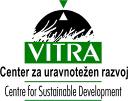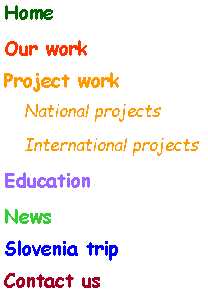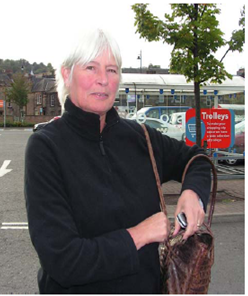|
ŠKIS—International partner and hosting organisation ARCH |
|
SKIS focused on the development of skills and training within the public sector. The variety of partner organisations in Scotland was chosen to encourage a ‘cross pollination’ of skills, techniques information and ideas between Scottish practioners and their Slovenian counterparts. The organisation of the project divided the programme between formal meetings and discussions, and site visits with practical experiences and ‘hands on’ opportunities. This created chances for the free transfer of ideas, generated a dialogue between participants and hosts and between the participants themselves. The training delivered throughout the SKIS programme was designed to improve the skills and competencies of the participants by giving them opportunities to interface with those actually involved in day to day work within the public sector.
ARCH have worked in partnership with Vitra Centre for Sustainable Development in several European funded programmes within the last 5 years, most importantly the Nature Exchange programme which is now in its 4th year. We perceive the SKIS project to be reciprocal to Nature Exchange, allowing participants from Scotland and Slovenia to experience each others natural and environmental management practices at first hand.
This was the first time that ARCH had hosted a SKIS programme, and we all learned a great deal from it. I believe that we tried to fit in too many visits and meetings. By the end of the programme the participants were very tired and found it increasingly difficult to concentrate. We saw that practical visits where participants were able to interact directly with staff were of the most interest, that everyone was more engaged, had more questions and gained the greater benefit from the day. Two perfect examples would be the Wind Farm Development at Braes of Doune, where the group were given a guided tour of the site by the engineers, who could explain the pros and cons of this huge development directly. Braes of Doune has caused public anxiety in terms of its visual impact and its impact on the environment. The second example was the visit to Tynedrum Lead Mines. Here the group were guided up steep mountain tracks to look at the lead workings and to discuss the implications of allowing the public access to this area. Both of these visits generated talk, questions, discussions and comparisons with practices in Slovenia and elsewhere. Future programmes would be improved by reducing the number of visits and llowing participants more free time to discuss between themselves the importance of the visit, and to give them time to explore the culture and the heritage of the host country.
The SKIS group came from a wide range of backgrounds and interests, I feel that the programme would be more effective if in future we learned from Vitra’s project management and programming and devoted a day to each relevant topic, Civil Society Day, Public Access Day, Water Day and Wind Farm Day. This would allow us to be sure that each discipline was catered for and each participant was aware of the relevance of the proposed programme to the work and training undertaken by the groups.
Libby Urquhart, ARCH Network |


|
The ARCH Network is a growing Scottish non-government (NGO) organisation which has been running socially-inclusive projects across Europe since its conception in 2002.
One of our main objectives is innovation in training and teaching in the fields of the environment, natural history, heritage and conservation. ARCH have developed a strong UK partner network with organisations who deliver this kind of training. These bodies include NGO’s like Farming and Wildlife Advisory Groups, the National Trust for Scotland, Royal Society for the Protection of Birds, The Scottish Wildlife Trust and Government agencies like Scottish Natural Heritage, the Scottish Environmental Protection Agency, Local and District Councils and many others. This network of partners allows us to create relevant and interesting programmes for incoming trainers and students. |
